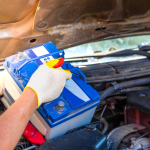As the warm months roll in and temperatures rise, a well-functioning car air conditioning system becomes an essential part of any driving experience. Whether you’re embarking on a long road trip, commuting to work, or simply running errands around town, a cool and comfortable cabin can make all the difference. However, like any mechanical system, your car’s air conditioning requires regular care and maintenance to keep it performing at its best.
In this article, we’ll share some practical tips and tricks to help you maintain your car’s air conditioning system, ensuring it remains efficient and reliable. From simple check-ups to troubleshooting common issues, you’ll be equipped with the knowledge you need to stay cool and comfortable all summer long. So, buckle up and let’s dive into the world of car air conditioning!
Table of Contents
- Understanding How Car Air Conditioning Works
- Common Issues That Affect Your AC Performance
- Simple Maintenance Tips for a Cooler Ride
- When to Seek Professional Help for Your AC System
- Q&A
- The Way Forward
Understanding How Car Air Conditioning Works
Understanding the mechanics behind car air conditioning can help you maintain it effectively. At its core, the air conditioning system operates using a refrigerant, a special fluid that easily evaporates and condenses. This process begins with the compressor, which compresses the refrigerant, raising its pressure and temperature. The high-pressure gas then travels to the condenser, where it dissipates heat and transforms into a liquid. This liquid refrigerant continues through an expansion valve, where it expands and cools down before entering the evaporator. Here, it absorbs heat from the cabin, creating the refreshing cold air that we enjoy during hot weather.
Regular maintenance of your car’s air conditioning is crucial for optimal performance. Here are some essential tips to keep your system cool and efficient:
- Run the A/C regularly: Even in cooler months, switching on your A/C helps maintain the system and prevents seals from drying out.
- Check refrigerant levels: Low refrigerant can cause suboptimal cooling; ensure it’s at the right level or get a professional check.
- Clean or replace filters: Clogged filters restrict airflow; regular cleaning or replacement promotes better air circulation.
- Inspect the condenser and evaporator: Keep these components free from debris to ensure heat exchange remains effective.
Read More: Car Insurance Tips to Save Money and File Claims Easily
Common Issues That Affect Your AC Performance
Several factors can hinder your car’s air conditioning performance, leading to discomfort during hot weather. One of the most common issues is a refrigerant leak, which can cause a significant drop in cooling efficiency. Make sure to regularly check for any signs of leaks, such as oily spots around hoses or connections. Another major problem is a clogged cabin air filter, which can restrict airflow and reduce cooling effectiveness. Keeping the filter clean or replacing it as needed can make a noticeable difference in your AC’s performance.
Furthermore, the compressor, which is the heart of the AC system, can develop issues that compromise cooling. It’s essential to listen for unusual noises coming from the compressor, as they may indicate a problem. Additionally, a malfunctioning blower fan can prevent cold air from circulating properly, so ensure that the fan is functioning at all speeds. Regular maintenance and timely repairs will help you avoid these common pitfalls and keep your AC running smoothly. Below is a quick reference table to summarize these issues:
| Issue | Symptoms | Solution |
|---|---|---|
| Refrigerant Leak | Weak airflow, hissing sounds | Inspect and repair leaks, recharge refrigerant |
| Clogged Cabin Air Filter | Reduced airflow, musty smell | Replace or clean the cabin air filter |
| Compressor Issues | Unusual noises, failure to cool | Check and repair or replace the compressor |
| Malfunctioning Blower Fan | No air or fluctuating airflow | Inspect and repair the blower motor |
Simple Maintenance Tips for a Cooler Ride
Keeping your car’s air conditioning running smoothly doesn’t have to be complicated. Start by regularly checking and replacing the cabin air filter. A dirty filter can restrict airflow and reduce the efficiency of your AC system. Aim to replace it every 12,000 to 15,000 miles or at least once a year. Additionally, make it a habit to test your AC every few months, even during cooler seasons. This way, you can detect any issues early on, ensuring you stay comfortable throughout the summer heat.
Another important aspect is to maintain the refrigerant levels. If you notice that your car air conditioning isn’t blowing as cold as it used to, it might be time to check the refrigerant. Keep an eye out for any signs of leaks or unusual noises, as these can indicate underlying problems. Regularly scheduled professional inspections can also help catch issues before they escalate. Here’s a quick checklist to keep your car’s AC in peak condition:
- Check cabin air filter: Replace every 12,000 – 15,000 miles.
- Test AC system: Do it every few months.
- Monitor refrigerant levels: Look for leaks and noises.
- Schedule professional inspections: Annually is ideal.
When to Seek Professional Help for Your AC System
Maintaining your car’s air conditioning system is crucial for comfort during hot weather, but there are times when DIY fixes just won’t cut it. If you notice that your car air conditioning is blowing warm air despite being set to the coldest setting, it may indicate a refrigerant leak or a failure in the compressor. Additionally, if you hear strange noises or experience unusual smells when you turn on your car air conditioning, it’s a sign that professional intervention is warranted. Other red flags include water pooling inside your vehicle or a significant drop in airflow, which could point to clogged filters or ducts.
It’s also wise to seek the expertise of a technician if you haven’t serviced your car air conditioning system in over a year. Regular maintenance can extend the lifespan of your system, and experts can perform checks that catch issues before they escalate. Below are some key indicators that suggest it’s time to consult a professional:
- Warm air blowing from vents
- Unusual noises or vibrations
- Unpleasant odors or musty smells
- Frequent system cycling or failure to cool
- Visible leaks from the car air conditioning unit
Q&A
Q&A: Car Air Conditioning – Tips To Keep It in Shape and Cold
Q1: Why is it important to maintain my car’s air conditioning system?
A1: Maintaining your car’s air conditioning system is crucial for several reasons. First, it ensures that you stay comfortable during hot weather, making your driving experience more pleasant. Second, a well-maintained system is more energy-efficient, which can save fuel and reduce wear on your engine. Lastly, regular maintenance can prevent unexpected breakdowns, saving you money on costly repairs down the line.
Q2: How often should I have my car’s air conditioning system serviced?
A2: It’s generally recommended to have your air conditioning system serviced at least once a year. However, if you notice a decrease in cooling performance or hear unusual sounds when you turn it on, it’s best to have it checked sooner. Regular use of the car air conditioning, even in cooler months, can help keep the system lubricated and functioning well.
Q3: What are some common signs that my air conditioning system might need a check-up?
A3: Look out for these signs indicating your air conditioning might need attention:
- Weak airflow from the vents
- Unpleasant odors when the car air conditioning is running
- Noticeable drop in the cooling efficiency
- Unusual noises while operating
- Leaking refrigerant (look for wet spots or puddles under your car).
If you spot any of these issues, it’s time to take your car to a professional for an evaluation.
Q4: How can I maximize the efficiency of my car’s air conditioning system?
A4: Here are some tips to enhance your car air conditioning’s performance:
- Keep your car clean: Regularly clean the cabin air filter to ensure you’re getting the best airflow.
- Park in the shade: Whenever possible, park in shaded areas or use sunshades to cool your car down before starting the car air conditioning.
- Use recirculation mode: This setting can help cool your car faster by reusing the air inside instead of pulling in hot air from outside.
- Don’t overload your car: Extra weight can make your car work harder, impacting car air conditioning efficiency.
Q5: Is it normal for my car’s AC to occasionally blow warm air?
A5: It’s not uncommon for the air conditioning to blow warm air briefly, especially in extremely hot weather conditions or if you’ve just started the vehicle. However, if it continues to blow warm air after a few minutes, it’s best to have it inspected. This could indicate low refrigerant levels, a faulty compressor, or a problem with the system that needs addressing.
Q6: What can I do at home to maintain my car’s air conditioning?
A6: You can perform a few simple maintenance tasks at home:
- Replace or clean the cabin air filter: A clogged filter can restrict airflow and reduce cooling efficiency.
- Check for leaks: Regularly check under the car for signs of refrigerant leaks or fluid pooling.
- Run the AC regularly: Even in winter, run your car air conditioning for about 10 minutes once a month to keep the system properly lubricated.
- Keep the vents clean: Wipe down the air vents and remove dust to ensure maximum airflow.
Q7: Can I attempt to recharge my car’s AC system myself?
A7: While there are DIY recharge kits available, it’s advisable to consult a professional if you suspect low refrigerant levels. Improper handling of refrigerants can lead to environmental harm or damage to your vehicle. A trained technician can properly assess and recharge your system, ensuring it remains in peak condition.
Q8: Are there any seasonal tips for my car’s air conditioning?
A8: Absolutely! As summer approaches, it’s a good idea to test your car air conditioning to ensure it works efficiently before the heat hits. For winter, run the AC for a few minutes each month to keep the parts lubricated and prevent moisture build-up. In spring, consider a thorough inspection to get everything ready for the hot months ahead.
By following these tips and being proactive about your car’s air conditioning system, you can ensure a cool and comfortable ride throughout the year. Happy driving!
The Way Forward
keeping your car’s air conditioning system in top shape is essential not only for your comfort but also for the longevity of your vehicle. By following these simple tips—such as regular maintenance checks, changing the cabin air filter, and using your car air conditioning system even in cooler months—you can ensure that your air conditioning remains efficient and effective.
A well-functioning car air conditioning system not only makes your drives more enjoyable but can also help maintain the overall value of your car. So, take a few minutes to give your car air conditioning the attention it deserves, and you’ll be rewarded with refreshing cool air no matter how hot it gets outside. Drive safe, stay cool, and enjoy the ride!











